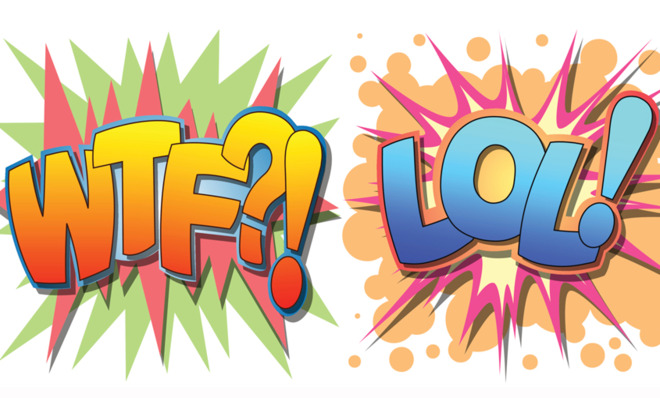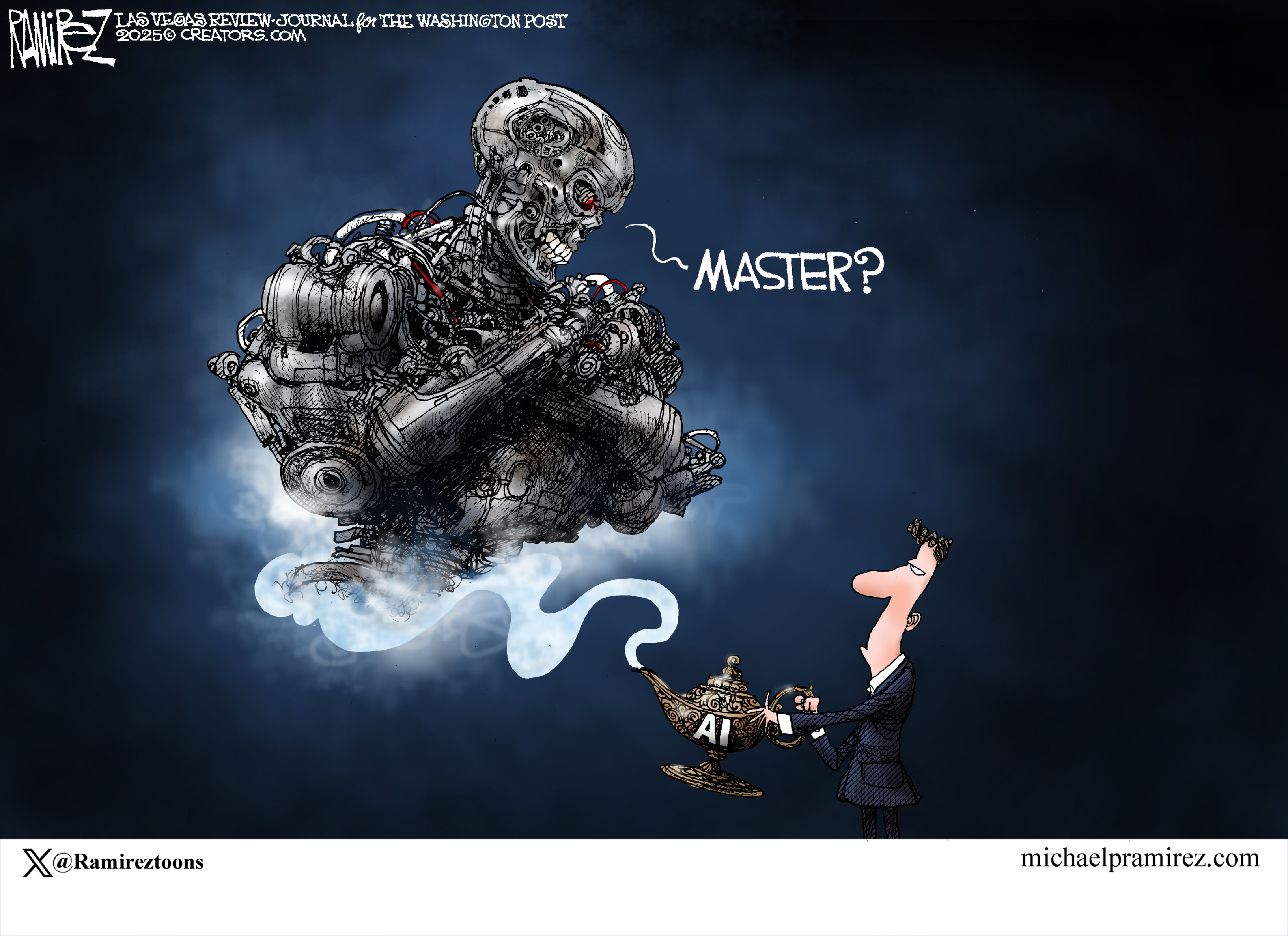Capital letters: FTW or WTF?
Your comprehensive, unassailable guide on when and where to capitalize


OMG!
WHAT??
CAPITAL LETTERS! I swear they are The Most Annoying Thing! And yet SUPER useful too!
Subscribe to The Week
Escape your echo chamber. Get the facts behind the news, plus analysis from multiple perspectives.

Sign up for The Week's Free Newsletters
From our morning news briefing to a weekly Good News Newsletter, get the best of The Week delivered directly to your inbox.
From our morning news briefing to a weekly Good News Newsletter, get the best of The Week delivered directly to your inbox.
Seriously, they are SO good for making things just leap off the page. And yet they are SO confusing. No one is sure exactly how to use them. NO ONE! Professional editors have to turn to guides that say what should and shouldn't be capitalized, AND THE GUIDES DON'T EVEN AGREE WITH EACH OTHER SOMETIMES.
So, what can we do about this? I'll tell you what. But first, ask yourself: Why do we even have capital letters? Most other alphabets don't. Hebrew, Arabic, Hindi, Thai, Burmese, Tibetan, Amharic… Really, it's pretty much just Western alphabets such as Latin, Greek, and Cyrillic (Russian etc.) that have the upper case/lower case distinction. Where did that come from?
Actually, the real question is why we have lower-case letters. Originally, the Latin alphabet (and the Greek one, too) had only the capital forms. That's why when you see Latin inscriptions they're often something like ANNO DOMINI MMXIII.
There are two big factors that led to having the two sets of letters: First, because we didn't have printing presses and we had to copy everything by hand. Then, because we did have printing presses.
When scribes had to copy text over and over and over again, it led to a more fluid style of writing. Letter forms changed and became easier to write quickly. Along the way some letters came to have bits that stuck up above the rest or hung down below the line. But in certain places, you wanted a fancier, more ostentatious letter: the first word of a page or paragraph, the first letter of an important name… For those more ornate letters, the older, less fluid, more inscriptional forms were used. And so a distinction came gradually into being: Use the big letters to grab attention.
Then, when moveable type was invented, the two kinds of letters were cast in metal. They even had their separate boxes: One box (a big case, actually) had all the big old letters for Important Words, and the other one — set below the first one — had all the smaller, more varied, fluid kind for use everywhere else. The position of these two cases of letters gave us the terms upper case and lower case. And since we had these different letter forms, of course we had to use them!
So now, since we have them, how should we use them? Should we use them?
If you're waiting for me to say we'd be better off without capital letters, sorry to disappoint you. I don't want to abolish them; I think they're actually useful. Overused, yes. But very useful.
they're very helpful for identifying the starts of sentences, for one thing. periods aren't very big. the eyes are glad for the extra hint. see? the printed word doesn't carry intonational cues.
They're nice to have on names, too. Not just because it makes you feel better to see your initials sticking out on the page — though it probably does — but because it makes it easier for readers to see names on the page. When you're referring to a document, the names are usually among the most important things, and it's a lot easier to find them when they have Capital Letters on them, because Capital Letters Stand Out.
So that's an argument for using capital letters on Anything Important, right? Not quite. Remember, The Big Letters Grab Attention. Capital letters are like exclamation marks or swear words: Judicious use can be very effective, but they lose their effect with overuse. An Official Sign With Every Word Capitalized Just Seems Self-Important And Gets To Be Like A Finger Jabbing You Repeatedly. Corporate documents that capitalize whatever Things they think are Important tend to feel messy and a bit confused and confusing — and self-important, too.
So here's a quick guide to where to use capitals. Stick with these rules, and you'll draw attention to the words that really matter and won't Drive Everyone Crazy.
Where do you use ALL CAPS?
Anywhere you want to seem EXCITED AND SHOUTING. Also for acronyms (AIDS, WTF). And pretty much NOWHERE ELSE. Don't use them in extended bits of text; they're harder to read because they don't have the same uneven contours as lower-case text — we actually recognize words more quickly by their skylines, so to speak. In some cities, they've stopped using all caps in street signs for this reason.
How do you capitalize titles of books, articles, movies, etc.?
This is very easy in many languages: You just capitalize the very first word, plus any words that you would capitalize anywhere you use them. In English, we are moving toward this, but in book and movie titles we still go with the old standard, which is to capitalize the first word and then every word except articles (a, the), conjunctions (and, but), and prepositions of four or fewer letters (for, from, to, in, by, etc.). Programs such as MS Word will automatically capitalize every word including those, but that's not standard — not yet, anyway. Decide whether you're going to capitalize the second words in compounds or not ("The Half-wit" or "The Half-Wit"?) and be consistent. And remember: You must capitalize all verbs, including all forms of Be (Is, Are, Am), and all pronouns too (He, She, It, etc.). That's the rule — I didn't make it up.
What names and other words do you capitalize?
- If it's a name that could be found in the phone book or the index of an atlas, capitalize it.
- If you sometimes see a ® or ™ after it, go with whatever capitalization you usually see it with, unless it's all caps or no caps, in which case, capitalize the first letter only. I don't care if the brand manager puts it in all caps. You don't have to.
- If it's an official title being used with a person's name, capitalize it (President Obama); if it's not with a name, it's really just a job description and so it doesn't need a capital (the president).
- If it's a name for some ordinary thing like a disease, don't capitalize it, even if it has an acronym that's capitalized (AIDS but acquired immunodeficiency syndrome).
- If it's a stock phrase (You're welcome) or a sign (Please stay off the lawn), capitalize only the beginning of a sentence. Otherwise, it feels really stiff and forced. The capitals get to be like little spikes.
- If it's just something that feels Important to you, indicate its importance with bold or italics or something like that rather than capitalizing it, unless you want to be cute or ironic. Don't just capitalize it because you feel like it. That gets to be like someone who uses the "f" word all over the place. It loses its effectiveness.
You want the TL;DR? Here are two simple rules to live by:
1. If you're at all unsure, look it up.
2. When in doubt, don't capitalize. Remember: Every unnecessary capital letter brings self-important business-speak one step closer to conquering the world. Save us from A Fate Too Tedious To Imagine.
Thank you. And you're welcome.
A free daily email with the biggest news stories of the day – and the best features from TheWeek.com
James Harbeck is a professional word taster and sentence sommelier (an editor trained in linguistics). He is the author of the blog Sesquiotica and the book Songs of Love and Grammar.
-
 June 29 editorial cartoons
June 29 editorial cartoonsCartoons Sunday's political cartoons include the AI genie, Iran saving face, and bad language bombs
-
 A tall ship adventure in the Mediterranean
A tall ship adventure in the MediterraneanThe Week Recommends Sailing aboard this schooner and exploring Portugal, Spain and Monaco is a 'magical' experience
-
 How drone warfare works
How drone warfare worksThe Explainer From Ukraine to Iran, it has become clear that unmanned aircraft are rapidly revolutionising modern warfare
-
 In the future, will the English language be full of accented characters?
In the future, will the English language be full of accented characters?The Explainer They may look funny, but they're probably here to stay
-
 10 signature foods with borrowed names
10 signature foods with borrowed namesThe Explainer Tempura, tajine, tzatziki, and other dishes whose names aren't from the cultures that made them famous
-
 There's a perfect German word for America's perpetually enraged culture
There's a perfect German word for America's perpetually enraged cultureThe Explainer We've become addicted to conflict, and it's only getting worse
-
 The death of sacred speech
The death of sacred speechThe Explainer Sacred words and moral terms are vanishing in the English-speaking world. Here’s why it matters.
-
 The delicate art of using linguistics to identify an anonymous author
The delicate art of using linguistics to identify an anonymous authorThe Explainer The words we choose — and how we use them — can be powerful clues
-
 Dashes and hyphens: A comprehensive guide
Dashes and hyphens: A comprehensive guideThe Explainer Everything you wanted to know about dashes but were afraid to ask
-
 A brief history of Canadian-American relations
A brief history of Canadian-American relationsThe Explainer President Trump has opened a rift with one of America's closest allies. But things have been worse.
-
 The new rules of CaPiTaLiZaTiOn
The new rules of CaPiTaLiZaTiOnThe Explainer The rules for capitalizing letters are totally arbitrary. So I wrote new rules.
